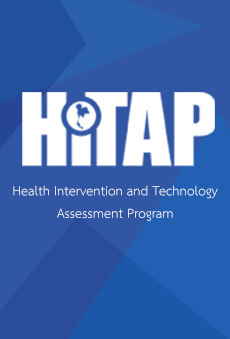This website uses cookies so that we can provide you with the best user experience possible. Cookie information is stored in your browser and performs functions such as recognising you when you return to our website and helping our team to understand which sections of the website you find most interesting and useful.
Research Proposal: Convergence of Digital Health Platforms and Health Information Systems (HIS) Implementation in Thailand (ConvergeDH)

Details
Digital health and Health Information Systems (HIS) are dramatically altering the landscape for health. Thailand achieved Universal Health Coverage (UHC) in 2002. However, the delivery of health services relies heavily on manpower without digitisation, and the COVID-19 pandemic has exposed the lack of adequate digital health platforms in the country. Remedying this issue requires convergence across the health, digital economy, industrial and innovation sectors and collaboration with the private and the non-governmental actors. Thailand has made progress in the application of digital interventions for health, a process accelerated during the COVID-19 pandemic by the need for timely and reliable data and public health issues like tuberculosis, migrant worker’s health, and road traffic injuries. Notwithstanding these advancements, there remain areas in need of further development. These include overcoming fragmentation in digital health systems and strengthening an integrated approach to health through digital interventions.
The World Health Organization (WHO) and the Thai Ministry of Public Health, along with a range of stakeholders and partners are in the process of developing a Country Cooperation Strategy (2022-26) to identify and focus on priority areas of engagement. Digital health and HIS has been identified as one of the priority areas for the WHO-CCS (2022-26) years. As part of this programme, this proposal seeks to create a national level collaborative digital health governance mechanism to support the development of Thailand’s digital health and integrated health information systems with the support from the WHO, through technical support and advocacy, in the following five focus areas: I. Landscape analysis for digital health and health information systems in Thailand; II. Standards and interoperability of datasets for migrant workers; III. Framework for health data management and data sharing with data protection in Thailand; IV. Open data catalytic initiative for research and policy support in Thailand; and V. Virtual hospitals and telemedicine in Thailand.
This proposal will be implemented by a range of partners in Thailand that are involved in digital health and HIS initiatives, and the team will seek to enlist other relevant stakeholder over the course of the programme. The proposal aims to support the continued growth and development of this field in the country through technical and policy-oriented outputs. Monitoring and Evaluation (M&E) approaches will be embedded in the programme to foster learning and knowledge management will be utilised to engage broader stakeholders and to sustain efforts. The objectives of the proposal are aligned with the Thai Ministry of Public Health’s digital health strategy and builds on current initiatives to provide targeted support. WHO’s support, through its social and intellectual capital, as well as its ability to source technical expertise and cross-country collaborations will be a key partner in this process.




